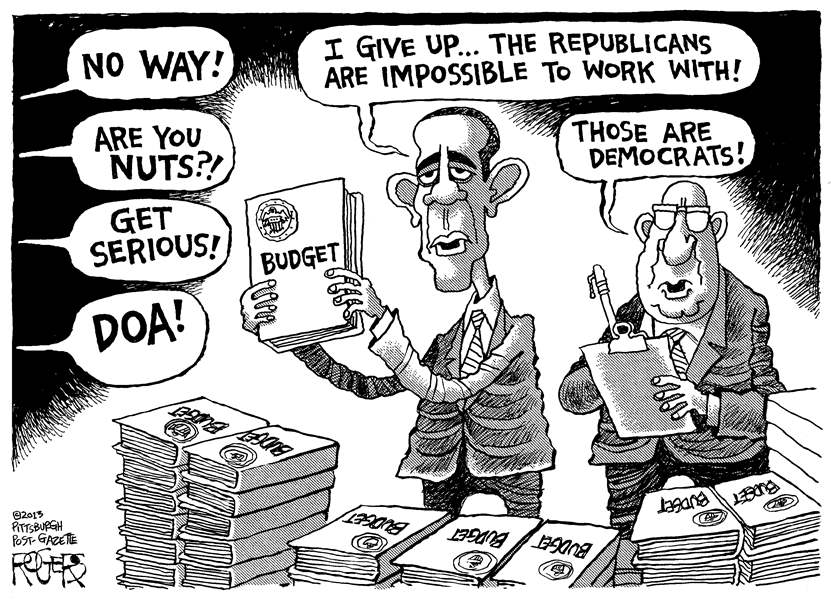
Obama’s budget gamble needs to pay off
A budget deal must include higher tax revenue and curbs on the growth of entitlement spending.
4/13/2013
Rob Rogers

Congressman Marcy Kaptur had to run. She was due on the House floor to make a speech challenging a proposal to limit Social Security, Medicare, and other federal benefits as part of a broader budget deal.
That position is consistent with the Toledo lawmaker’s long liberal record. But the ideas on entitlement spending she opposes form a key element of a budget plan offered by a fellow Democrat: the President.
The new budget President Obama is proposing takes a big risk. He is willing to offend a large segment of his own political base — progressive Democrats such as Miss Kaptur — to negotiate an overdue bipartisan agreement on long-term deficit and debt reduction.
Mr. Obama is calling the bluff of Republican congressional leaders, who have demanded that any budget package include major savings in entitlement programs. But the President’s gamble will succeed only if GOP lawmakers prove equally willing to stand up to their base and accept higher taxes on the wealthiest Americans.
There’s little reason for confidence on that score, based on Republicans’ record of intransigence and obstructionism. But there doesn’t appear to be a more realistic alternative at the moment.

Kaptur
Miss Kaptur told me late last week that she won’t vote for a budget bill that includes the President’s “chained CPI” proposal. That scheme would reduce Social Security cost-of-living benefit increases by redefining the consumer price index, a measure of inflation. Critics counter that older Americans are more, not less, afflicted by inflation than younger consumers, especially in the costs of health care and housing.
“Social Security should not even be on the table,” Miss Kaptur says. “It’s an earned benefit and a disability plan. I would never vote to cause any harm to our senior citizens. I don’t support that at all.”
As a ranking member of the House Appropriations Committee, which oversees spending measures, Miss Kaptur will have particular influence in the budget debate, even though her party is in the House minority. She is more positive about the rest of the President’s budget proposal, which she says can reduce the deficit (by a projected $1.8 trillion over a decade), promote economic growth, and help create high-skill jobs.
As it cuts overall spending by $1.2 trillion, the White House budget would make needed investments in such things as universal preschool, public works, alternative energy, job training, aid to higher education, and research and development. It would create 15 centers for manufacturing innovation across the country; Miss Kaptur wants to snag one for her district, which stretches from Toledo to Cleveland. Don’t bet against her.
But first, Congress has to pass a budget. And you can’t address the budget’s long-standing problems without curbing the growth of entitlement programs, any more than you can do so without raising more tax revenue.
Entitlements — notably Social Security, Medicare, and Medicaid — account for 60 percent of federal spending. Trying to fix the budget without touching entitlements leaves you with destructive nonsense such as the current sequester, which mandates mindless across-the-board spending cuts to both national defense and vital domestic programs.
There are ways to reform entitlements without targeting the poorest and most vulnerable Americans who rely on them. Mr. Obama’s budget would increase Medicare premiums on higher-income households. He would demand new efficiencies of Medicare providers — doctors, hospitals, and drug companies. (Less helpfully, the budget would continue to give too much money to private Medicare Advantage insurance plans.)
Instead of imposing the chained CPI to cut Social Security costs, I’d rather the President propose removing or raising the ceiling on the Social Security payroll tax, which does not apply once incomes exceed $113,700 a year. But if the cost-of-living proposal is the price the President is ready to pay to get Congress to approve the rest of his budget, then so be it.
That means buying the whole package, including higher taxes for upper-income households and corporations. Mr. Obama has told lawmakers of both parties that he doesn’t want them to treat his budget like a buffet, picking out the things they like and turning up their noses at the rest.
Of course, that’s exactly what they’re doing, especially Republicans. Senate Republican leader Mitch McConnell says Mr. Obama’s budget is not serious, even though it includes two dollars of spending cuts for every dollar of higher tax revenue. House Speaker John Boehner of Ohio says he is “encouraged” by parts of the President’s plan, but still isn’t ready to talk about taxes.
GOP leaders remain unwilling to concede the results of last November’s election. Instead, they continue to invoke the tyranny of the minority in the Senate through their abuse of the filibuster. The current GOP majority in the House reflects less the clear will of voters than the poisoned fruits of gerrymandering scams in states such as Ohio and Michigan.
Still, Miss Kaptur says she’s “70 percent” optimistic that the President’s budget will become the foundation of a meaningful bipartisan compromise. It has to happen soon, because Washington will run out of capacity to borrow money this summer. And all too quickly after that, the campaigns for next year’s elections will begin.
Mr. Obama’s budget proposal threatens to keep the national debt at too high a percentage of the nation’s economic output. It could cut too much from defense. But it’s a better, more politically realistic plan than either House Republicans or Senate Democrats have offered.
“I’m glad he sent a budget up, even if it’s a little bit late,” Miss Kaptur says. “It’s a moderate-growth budget, not robust. The overall proposal will be changed as it moves through both chambers, and the House will be more difficult, but it’s a solid starting point. I hope it won’t run into the same roadblocks as before.”
Let’s all hope so, because we’re living with the alternative to fiscal progress — and it’s weakening our country every day.
David Kushma is editor of The Blade.
Contact him at: dkushma@theblade.com or on Twitter @dkushma1.